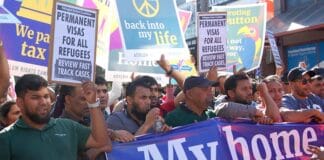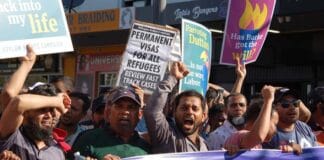More than three years since the Sri Lankan government declared “victory” in the 33 year-long civil war against the Tamil Tigers (LTTE), there has been a spike in the number of asylum seeker boats arriving at Australia’s Cocos Islands directly from Sri Lanka.
The numbers of people are small, but predictably both the press and the government have raised fearmongering calls to “stop the boats.” But the boats are arriving because of the ongoing persecution of Sri Lanka’s oppressed Tamil minority.
In 2009, UN Secretary Ban Ki Moon visited Menik Farm, the largest of the government internment camps for Tamils. 200,000 Tamils were imprisoned there. Describing it, he said: “I have travelled around the world and visited similar places, but this is by far the most appalling scene I have seen.”

Today, around 20,000 Tamils remain in these appalling camps. A further 69,000 Sri Lankan refugees live in 112 camps in the southern Indian state of Tamil Nadu.
A United Nations’ report last year recommended that the government of Mahinda Rajapaksa be investigated for war crimes, saying it was responsible for the vast majority of 40,000 civilian deaths, that its forces had deliberately shelled hospitals and Red Cross ships and had engaged in mass rape and summary executions.
The end of the war has not diminished discrimination against the Tamils. Indeed the Rajapaksa government refers to Sri Lanka as “the land of Sinhalas” (referring to the majority Sinhalese population), with all others seen as “visitors”. Not only Tamils, but also Muslims and Christian minorities are under threat. It’s also worth noting that a small minority of those fleeing by boat are Sinhalese.
“White van abductions”, where people are grabbed from city streets by plain-clothed men driving unmarked vehicles, are still commonplace. Amnesty International says 32 activists disappeared between Oct 2011 and May 2012. Human Rights Watch Asia recently reported that Tamils deported from Britain were beaten with batons and burnt with cigarettes.
The Tamil’s current situation was summed up at a recent London protest to commemorate Black July, an anti-Tamil pogrom in 1983. Ravi Kumar from the British Tamils Forum said: “During the 1983 pogrom, the Eezham Tamils could flee to the North as a sanctuary. Now, the extensive land grabs and militarisation of the Tamil homeland has made it unsafe for them.”
Despite the UN condemnations, the Rajapaksa government has received support from countries as divergent as Britain, China, and Israel. The US continues to block any challenges to Bush’s administration’s declaration that the LTTE is a terrorist organisation.
Tamils protested during the London Olympics opening ceremony, circulated petitions calling for Sri Lanka’s suspension from the games, and some activists went on hunger strike.
Australia’s role
As one of the Sri Lankan government’s strongest supporters, Australia is complicit in the repression of the Tamils. The Labor government has ignored Rajapaksa’s human rights abuses as it pursues its “stop the boats” agenda.
Shamefully, last October, Julia Gillard gave Rajapaksa the red carpet treatment at CHOGM in Perth. Labor has ignored Canada’s proposal to boycott the CHOGM 2013 in Sri Lanka if Rajapaksa’s human rights record doesn’t improve.
Immigration Minister Chris Bowen praised the regime when he visited Sri Lanka in May, saying, “We appreciate Sri Lanka’s ongoing cooperation in the area of people smuggling, in particular its new people smuggling legislation”.
Bowen also touted for more international students, and negotiated a bilateral agreement for more flight connections to boost tourism and trade.
While Labor is critical of Abbott’s policy to tow refugee boats back to Indonesia, Bowen actively encourages tow backs by the Sri Lankan government. More than 700 people, 400 in July alone, have been arrested and jailed this year as they tried to flee Sri Lanka.
When the Sydney Morning Herald’s Ben Doherty visited a poor west coast Tamil village, one man told him: “No job, no education, we have trouble from the police and army. We are desperate people”. Another said that after his boat was intercepted he was interrogated for two days and jailed for more than a month: “We slept chest to back, all packed in like sardines. I could not sleep and there was hardly any food”. He was released only after his sisters paid tens of thousands of rupees.
Tamil asylum seekers are now the second largest group in Australia’s detention centres (after Afghans) and in community detention (after Iranians). Some 60 Tamils are incarcerated indefinitely, found to be refugees, yet given negative ASIO security assessments. They are unable either to appeal or even see the text of ASIO’s decision.
The persecution of the Tamils is undeniable. The vast majority of the Tamils arriving in Australia are found to be genuine refugees. The Tamil asylum boats must be welcomed, not stopped.
Mark Goudkamp





